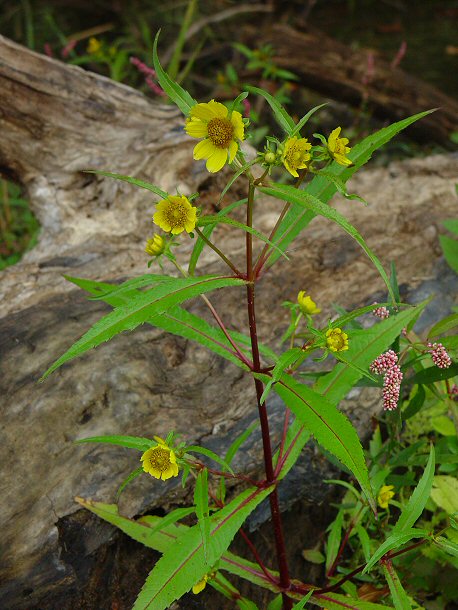Bidens cernua L.
Nodding Bur Marigold

Native
CC = 5
CW = -5
MOC = 65
© DETenaglia
Bidens cernua L.Nodding Bur Marigold | |
 |
Native CC = 5 CW = -5 MOC = 65 |
© DETenaglia |
|
Family - Asteraceae/Heliantheae Habit - Annual forb, sometimes taprooted, occasionally emergent aquatic. Stems - Loosely ascending to erect, to 80 cm, sometimes from a spreading base, occasionally rooting at the lower nodes, glabrous or rarely somewhat roughened with sparse, stiff, ascending hairs.
Leaves - Opposite, simple, sessile, often with bases fused around stem. Blades to 20 cm, oblong-lanceolate to oblanceolate, tapered at each end, sharply pointed, usually sharply toothed, glabrous.
Inflorescence - Solitary terminal heads or loose, open clusters. Heads - Radiate or rarely discoid, nodding in fruit. Involucre with the outer series of 5-9 bracts 6-30 mm long, spreading to more commonly reflexed, mostly leaflike, narrowly lanceolate or linear, the margins entire but usually minutely roughened, the outer surface glabrous or sparsely short-hairy toward the base; the inner series of 6-9 bracts 4-10 mm long, lanceolate to narrowly ovate or ovate, glabrous. Chaffy bracts narrowly oblong, straw-colored to yellowish-tinged at the tip.
Ray florets - Sterile, 6-8 per head or rarely absent, the corolla usually showy, 10-15 mm long, yellow. Disk flowers - Fertile, 40-100 per head, the corollas 3-4 mm long, yellow. Pappus of 4 awns mostly 2-4 mm long, these with downward-pointed barbs, erect at fruiting.
Fruits - Achenes 4-8 mm long, narrowly wedge-shaped, with persistent barbed pappus awns, flattened and somewhat 4-angled in cross-section, the angles pale and somewhat thickened or sometimes narrowly winged, the faces sometimes with several faint longitudinal lines, dark brown to purplish black, glabrous or with sparse, short, pustular-based hairs.
Flowering - August - October. Habitat - Wet soils, streambanks, ponds, sloughs, ditches, railroads. Origin - Native to U.S. Lookalikes - Other members of the genus Bidens, and more broadly, many other members of the Asteraceae have similar flowering heads. Other info. - This species can be found scattered throughout most of Missouri, possibly excepting the Glaciated Plains division. It occurs throughout most of the northern 2/3 of the U.S. and into Canada. It is easy to identify by its wet habitat, showy yellow flower heads, and opposite leaves fused around the plant stem. The specific epithet cernua means "nodding," but the heads only nod consistently when in fruit. Steyermark and others have named numerous infraspecific entities, but these appear to represent ecological variants and are not currently recognized in Missouri. Photographs taken along the shores of the Current River, Shannon County, MO., 9-20-03 (DETenaglia); also at Onondaga Cave State Park, Crawford County, MO, 9-25-2014, and Glassberg Conservation Area, Jefferson County, MO, 10-5-2018 (SRTurner). |